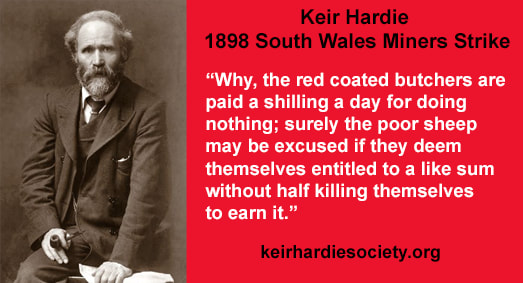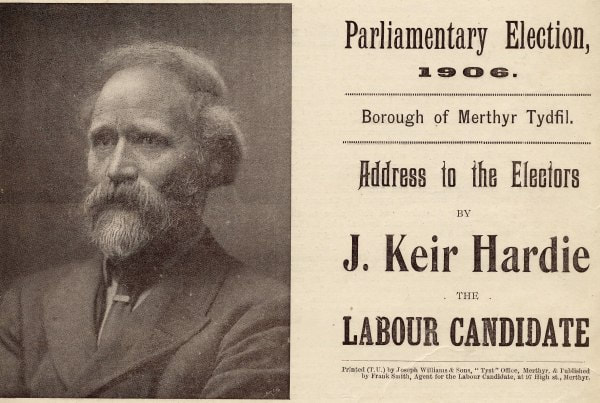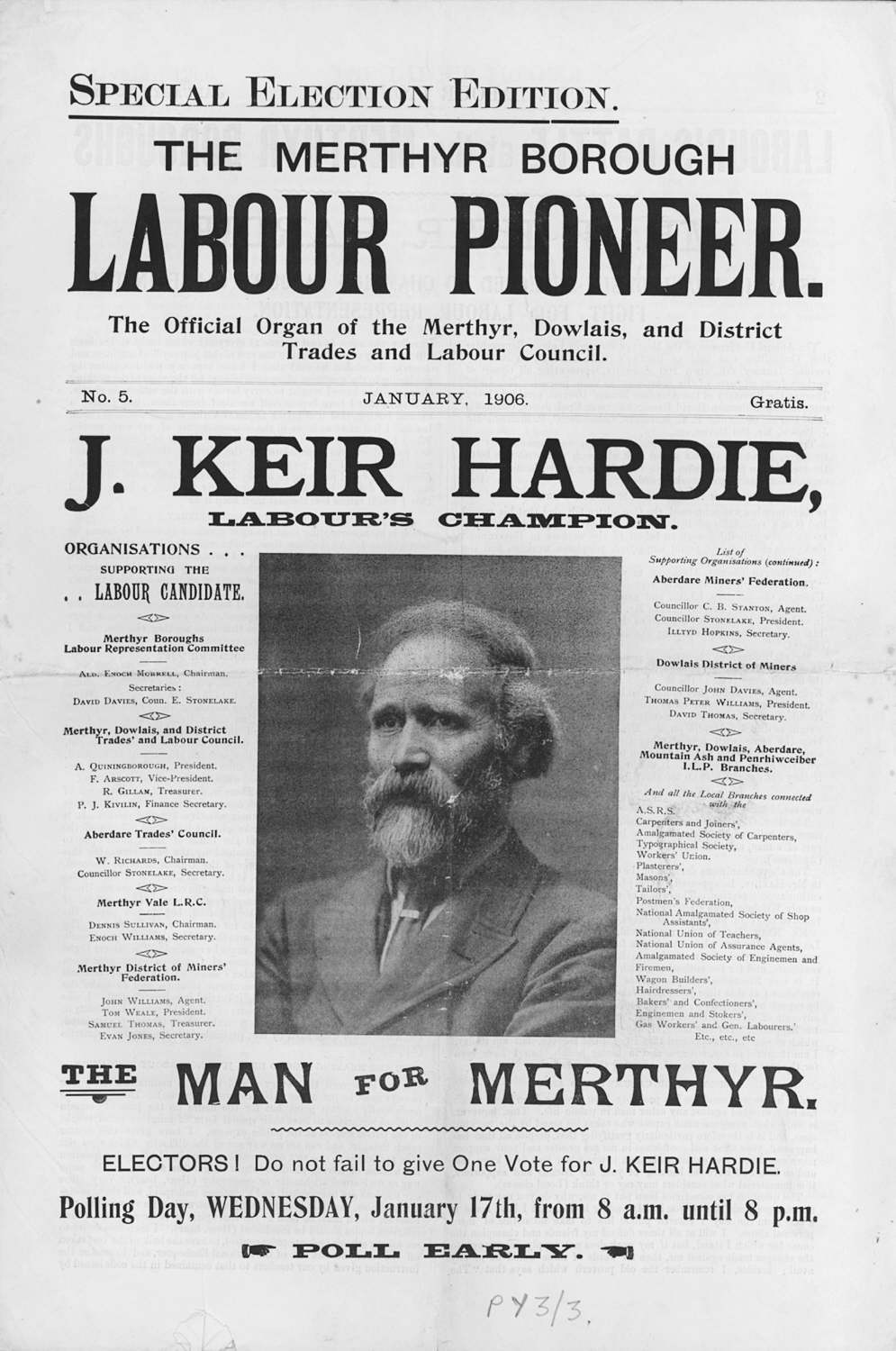|
The 1900 general election was held between 26 September and 24 October 1900, as voting then took place on different days in different constituencies. It is also called the Khaki Election because the ruling Conservatives, led by Lord Salisbury, hoped to capitalise on recent successes in the Boer War. However, the war was far from won and would grind on for another two years. This wouldn’t be the last time this ploy was used, with Lloyd George doing the same in 1918 and Margaret Thatcher in 1982 after the Falklands War. Keir Hardie was a Scot and had previously been the MP for West Ham South. He was also vehemently opposed to the Boer War, which might appear to be running against the jingoistic tide in the country at large. However, Hardie was no stranger to South Wales. In 1896, he had targeted South Wales with leaflets translated into Welsh and started a socialist society the following year. During the 1898 miners' strike in South Wales, Hardie had toured the coalfields, raising money for the miners through the Leader special strike fund. He even persuaded wealthy donors like Walter Crane, Thomas Lipton and George Cadbury to contribute. He was particularly critical of Lib-Lab miners’ MPs for failing to support the strike properly. The strike failed, but it did raise political consciousness. The miners started to meet politically and decided to put up Labour candidates against the Liberals who had let them down. The number of ILP branches in South Wales grew from 11 to 31. When the election was called, Hardie was reluctantly persuaded to stand in Preston (you could stand in two constituencies), a strong Tory seat with a garrison and a significant Catholic vote. The anti-war Cadbury’s (Hardie called them ‘the chocolate folks’) were prepared to fund his campaign only because there was no Liberal candidate there. Meanwhile, allies in South Wales wanted Hardie to stand in Merthyr Tydfil and worked out that they could fund the campaign through ILP and the newly formed Trades Councils. The Merthyr miners supported a conservative Lib-Lab Mining Federation Official called Brace for the seat. However, rank-and-file miners packed the meeting and won Hardie the nomination. Hardie benefited from a split between the two Liberal candidates. D.A. Thomas was a radical who opposed the war, while P. Morgan supported it. Morgan was a gold prospector who had rarely been seen in the constituency and was investing in foreign coal, a threat to Welsh mines. The prospective Tory candidate thought Merthyr was in Newcastle, then Cardiff, missing his nomination. While imperialism was strong, there was also a pacifist tradition. He also benefited from a working-class radicalism that could be traced back to the Merthyr riots in 1831, Chartism, and the post-Reform Act election of 1868. Hardie set out for Merthyr after losing at Preston, only spending around 11 hours campaigning, although he benefitted from the loan of the new-fangled motor car. Voting took place in Merthyr on 3 October, and to everyone's amazement, he squeezed into second place 1700 votes ahead of Morgan (Thomas, 8,598; Hardie, 5,645; and Morgan, 4,004). The South Wales Daily Post called it ‘the greatest possible surprise’ and ‘an astonishing result.’ The miners carried him back to his hotel on their shoulders. He was one of only two Labour Representation Committee members elected. Queen Victoria died before the new Parliament was due to convene in 1901. Hardie's first motion regretted that Queen Victoria had not seen fit to 'recommend the office of hereditary ruler be abolished.' After that was ruled out of order, he opposed the civil list expenditure for the new King because 'when taxes were being increased... when wages were going down', huge increases for the royal family were 'indefensible'. He also stuck to his anti-war position, saying: "I appeal for the independence of the Boers as a means of settlement, because we have no right to take their independence from these people. It is not that we cannot subdue the Boers, that is not my point of view. The words "Do unto others as ye would they should do unto you" apply to nations as they do to individuals, and a nation professing to be Christian should do its best to uphold so sacred a charge. Not only are we trying to do that which we have no right to do, but we are attempting the impossible. Our army may wear down the Boer resistance, but you cannot wear down the Boer independence." (Hansard, 26 February 1901, Line 1276) Despite these issues, Hardie's focus was, as ever, on poverty and industrial policy. Attacking the capitalists and landlords, as well as the established church. He identified himself with the leading progressive causes in Wales and supported Home Rule for Wales as he had for Scotland. The Red Dragon and the Red Flag was his watchword – radical socialism in a highly distinctive Merthyr form. The constituency became the base for building the labour movement. In April 1901, Hardie made is famous 'Case for Socialism' speech in Parliament. This has been reproduced in an excellent video by Royal Holloway University. Hardie successfully defended the seat in the 1906 and then the 1910 election. This was despite a virulent media campaign funded by the Anti-Socialist Coalition. They flooded the constituency with anti-Hardie material supported by the Merthyr Express and Western Mail. Leaflets described Hardie as a libertine, atheist and a wealthy man. He was so wealthy that he apparently owned a 'castle in Scotland'. The Liberals distributed 'an indecent picture of him... calculated to make people think him an advocate of free love.' Hardie said, 'No one can know what suffering a man has to endure by misrepresentation.' Hardie would not be the last Labour leader to face such a media campaign! On a personal note, my first full-time union job was in South Wales. As a very young official, one of my first meetings was in the old Merthyr Town Hall. At the top of the grand stairs inside the building was a bust of Keir Hardie welcoming me to the struggle. An inspiration I have never forgotten. Dave Watson
0 Comments
|
AuthorThis is the Blog of the Keir Hardie Society. Archives
March 2024
Categories |



 RSS Feed
RSS Feed